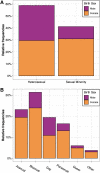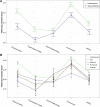Sexual Minority Identities in Autistic Adults: Diversity and Associations with Mental Health Symptoms and Subjective Quality of Life
- PMID: 37346988
- PMCID: PMC10280200
- DOI: 10.1089/aut.2021.0088
Sexual Minority Identities in Autistic Adults: Diversity and Associations with Mental Health Symptoms and Subjective Quality of Life
Abstract
Background: Although disparities in mental health and subjective quality of life (QoL) have been reported for autistic adults, reasons for these disparities are poorly understood. A potential factor in these disparities is exposure to social stressors related to minority status (i.e., minority stress), including stigma and discrimination. Autistic individuals are more likely than nonautistic individuals to be from groups with other minority identities, including sexual minorities (i.e., sexual orientations such as asexual, bisexual, gay). However, to date, few studies have examined whether sexual minority autistic adults experience diminished mental health relative to heterosexual autistic adults, and no research has examined subjective QoL for sexual minority compared with heterosexual autistic adults.
Methods: Participants were 651 autistic adults aged 18.5 to 83.3 years recruited through Simons Powering Autism Research's Research Match. All participants resided in the United States. Participants completed surveys online, including measures of anxious and depressive symptomatology, perceived stress, and subjective QoL. Participants reported their sexual orientation and other sociodemographic variables.
Results: A large proportion of autistic adults reported a sexual minority identity (41.2%), and a diversity of sexual identities was reported. Sexual minority autistic adults reported poorer mental health and lower subjective QoL across all assessed domains relative to heterosexual autistic adults.
Conclusion: Understanding factors that may be associated with poorer mental health and decreased subjective QoL in autistic adults is critical and has been identified as a research priority by autistic stakeholders. The findings reported here underscore the need to examine mental health and subjective QoL disparities among autistic individuals within a societal context, taking into consideration the potential of intersecting minority identities and increased social stressors, as these added stressors may increase risks for poorer outcomes.
Keywords: anxiety; autism; depression; quality of life; sexual minority; stress.
Plain language summary
Why is this an important issue?: Autistic people are at risk for mental health problems, such as depression and anxiety, and report lower quality of life. Autistic people are more likely than nonautistic people to identify as a sexual minority. Sexual minority identities are sexual orientations other than heterosexual, such as asexual, bisexual, or gay. Sexual minority persons are also at risk for mental health problems and lower quality of life. Autistic people who are sexual minorities may have even higher risk of mental health problems and lower quality of life.
What was the purpose of this study?: There is little research on mental health and quality of life in persons who are both autistic and identify as a sexual minority. Sexual minority autistic adults may be exposed to more minority-related stress than heterosexual autistic adults. People who belong to minority groups face added stress created by society. This added stress is referred to as minority stress, which includes things such as discrimination, rejection, or violence. Minority stress could increase risk for poor outcomes. We compared heterosexual and sexual minority autistic adults to see if having more than one minority identity (an autistic identity and a sexual minority identity) was associated with mental health or subjective quality of life. Subjective quality of life refers to how a person feels about parts of their life, such as their physical and psychological health or their living arrangements.
What did the researchers do?: We asked 651 autistic adults living in the United States to complete surveys online. Participants rated their anxiety, depression, and everyday stress; answered questions about their subjective quality of life; and reported their sexual orientation, sex assigned at birth, and gender identity. We compared sexual minority with heterosexual autistic adults to see if they differed for mental health or subjective quality-of-life ratings.
What were the results of the study?: A total of 41.2% of autistic adults reported a sexual minority identity. Autistic adults reported a diversity of sexual orientations, including asexual, bisexual, gay, and pansexual. Sexual minority autistic adults reported more depression, anxiety, and stress compared with heterosexual autistic adults. Sexual minority autistic adults reported poorer subjective quality of life across different areas of their lives compared with heterosexual autistic adults. Sexual minority autistic adults reported having less energy and more physical pain than heterosexual autistic adults. Sexual minority autistic adults also reported feeling more negative emotions and having problems with thinking/concentration. Sexual minority autistic adults reported more concerns about things such as having health care and transportation and greater worries about feeling safe in their homes and neighborhoods. Finally, sexual minority autistic adults were more likely to report that they faced barriers in their everyday lives (such as sensory sensitivities making it hard to grocery shop).
What are the potential weaknesses in the study?: Although we found significant differences between sexual minority and heterosexual autistic groups, other factors likely play a role in these results. For example, we know that not having enough social support can contribute to worse mental health and quality of life. Measuring other such factors is needed in future studies.
How will these findings help autistic adults now or in the future?: These findings highlight the need for more awareness of sexual minority identities in autistic adults. Understanding factors that may contribute to worse mental health and quality of life for autistic adults can help us improve well-being for all autistic people.
Copyright 2023, Mary Ann Liebert, Inc., publishers.
Conflict of interest statement
No competing financial interests exist.
Figures


Similar articles
-
"My whole life has been a process of finding labels that fit": A Thematic Analysis of Autistic LGBTQIA+ Identity and Inclusion in the LGBTQIA+ Community.Autism Adulthood. 2023 Jun 1;5(2):127-138. doi: 10.1089/aut.2021.0074. Epub 2023 Jun 13. Autism Adulthood. 2023. PMID: 37346993 Free PMC article.
-
What You Are Hiding Could Be Hurting You: Autistic Masking in Relation to Mental Health, Interpersonal Trauma, Authenticity, and Self-Esteem.Autism Adulthood. 2024 Jun 17;6(2):229-240. doi: 10.1089/aut.2022.0115. eCollection 2024 Jun. Autism Adulthood. 2024. PMID: 39139513 Free PMC article.
-
COVID-19 and Perceived Changes to Quality of Life, Anxiety, Depression, and Loneliness in Autistic and Other Neurodivergent U.K. Adults.Autism Adulthood. 2022 Sep 1;4(3):233-246. doi: 10.1089/aut.2021.0078. Epub 2022 Aug 31. Autism Adulthood. 2022. PMID: 36606155 Free PMC article.
-
Health disparities in one of the world's most progressive countries: a scoping review of mental health and substance use among sexual and gender minority people in the Netherlands.BMC Public Health. 2023 Dec 18;23(1):2533. doi: 10.1186/s12889-023-17466-x. BMC Public Health. 2023. PMID: 38110908 Free PMC article.
-
The Mental Health of Sexual Minority Individuals: Five Explanatory Theories and Their Implications for Intervention and Future Research.Annu Rev Clin Psychol. 2025 May;21(1):1-31. doi: 10.1146/annurev-clinpsy-081423-022014. Epub 2024 Dec 2. Annu Rev Clin Psychol. 2025. PMID: 39621422 Review.
Cited by
-
Self-reported masking in sexual minority and heterosexual autistic adults.Autism. 2025 Aug;29(8):2137-2150. doi: 10.1177/13623613251335738. Epub 2025 Apr 30. Autism. 2025. PMID: 40304097
-
Looking Through a Cultural Perspective: Autistic Young Adults' Experiences and Expectations in Sexuality and Relationship Education in the U.S.J Autism Dev Disord. 2025 Apr 19. doi: 10.1007/s10803-025-06831-x. Online ahead of print. J Autism Dev Disord. 2025. PMID: 40252202
-
Adverse Childhood Experiences and Health Outcomes Among Transition-Age Autistic Youth.J Autism Dev Disord. 2025 Aug;55(8):2844-2857. doi: 10.1007/s10803-024-06401-7. Epub 2024 May 21. J Autism Dev Disord. 2025. PMID: 38771506 Free PMC article.
-
Gender Diversity, Gender Dysphoria/Incongruence, and the Intersection with Autism Spectrum Disorders: An Updated Scoping Review.J Autism Dev Disord. 2024 Dec 4. doi: 10.1007/s10803-024-06650-6. Online ahead of print. J Autism Dev Disord. 2024. PMID: 39630339
-
What We Know and Do Not Know About Camouflaging, Impression Management, and Mental Health and Wellbeing in Autistic People.Autism Res. 2025 Feb;18(2):273-280. doi: 10.1002/aur.3299. Epub 2024 Dec 24. Autism Res. 2025. PMID: 39719862 Free PMC article. Review.
References
Grants and funding
LinkOut - more resources
Full Text Sources
Research Materials
